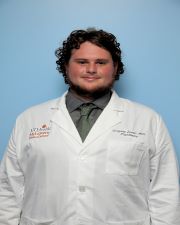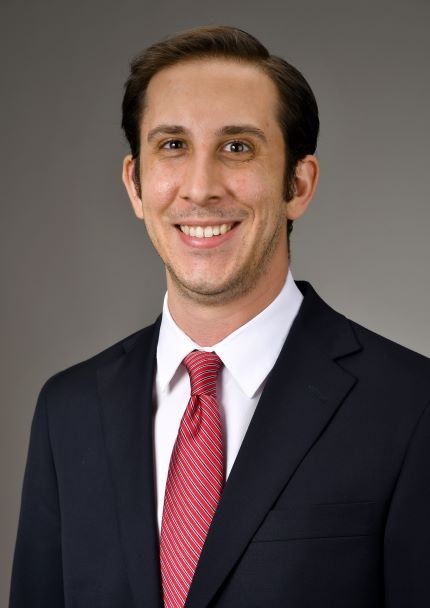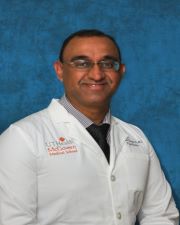Meet Our Residents
Edison Leung, MD, PhD – PGY4

Edison completed his medical studies and Ph.D at Albert Einstein College of Medicine focusing on molecular cancer biology. Edison’s current work focuses on understanding the signaling pathways that are altered in co-morbid alcohol and opioid substance use disorders compared to mono-substance use of alcohol or opioid use disorder.
Why I chose UTH Psychiatry Research Track: The vast cutting-edge research opportunities available at the program, the supportive and collaborative environment, and the mentorship to guide my career path attracted me to this program. Having been here for three years, this program has met those needs and so much more. I am excited for that this fourth year brings and the eventual goal of being a faculty member performing research.
Gregory Jones, MD – PGY4

Gregory obtained his MD from McGovern Medical School, The University of Texas Health Science Center at Houston. During medical school he studied the neuro-regenerative properties of mesenchymal stem cells, their exosomes, and several repurposed anti-inflammatory agents (such as teriflunomide). He also developed a deep passion for healthcare policy research and advocacy, partnering with several economists and oncologists to address pharmaceutical pricing schemes, the opioid epidemic, and the need for universal healthcare. Currently, he is investigating the peripheral immunomodulatory and epigenetic properties of psychedelic compounds. He also conducts clinical research surrounding ketamine and mood disorders in general.
Why I chose UTH Psychiatry Research Track: Many reasons led me to prioritize coming to our psychiatry residency. The ability to collaborate across myriad institutions in the Texas Medical center, combined with our department’s commitment to investigating psychedelic therapies, represented immense research potential given my interests. Transitioning into my PGY-4 year, I can confidently say I made the right decision.
Christopher I. Gurguis, MS, MD – PGY3

Christopher received his medical training from McGovern Medical School, The University of Texas Health Science Center at Houston. Christopher’s research focus is motivated by his background and broad interests in ecology and evolutionary biology. He developed these interests prior to entering medicine while studying the evolution of avian behavior. Currently, he is interested in the following areas: (i) behavioral development and evolution, (ii) evolutionary psychiatry, and (iii) individual differences in response to therapeutic interventions.
Why I chose UTH Psychiatry Research Track: I chose to pursue the research track in psychiatry at McGovern Medical School because Houston is home to the largest medical center at the world, firmly seating psychiatry as a specialized branch of medicine, and because the Harris County Psychiatric Center is the largest academic inpatient psychiatric hospital in the U. S. What more could a researcher want?
Muhammad Atif Akhtar, MD, CCRP – PGY3

Atif completed his medical degree from Dow Medical College, Karachi, Pakistan. He has worked in academics, clinical research, and clinical settings for many years. Prior to joining University of Texas-Houston, he worked in conducting clinical research in Autism and Mood disorders. Atif also has gained experience in conducting research in the Department of Psychiatry and Neurology at the UT-Houston, where he specialized in research in Multiple Sclerosis, as well as cognitive delays performing Neuro-Psychological testing and functional neuroimaging, such as fMRI. His interest is in child and adolescent psychiatry, including autism, mood disorders, ADHD and substance use disorders. He is currently exploring Cognitive Behavioral Therapy, Trauma Focused Therapy, Motivational Enhancement Therapy (MET) for substance use disorder, which complements his expertise in modern psycho-pharmacotherapies.
Why I chose UTH Psychiatry Research Track: I chose UT-Houston as it provides the unique patient population, vast research opportunities, great faculty, and excellent co-residents and fellows. As HCPC and Dunn being the largest psychiatric hospital in North America, it offers me to learn and excel in different psychiatric settings independently. Besides that, all my kids are born in Houston, so I passionately consider myself as proud Houstonian.
Brandi Quintanilla, DO, MS – PGY2

Brandi received her medical training at the West Virginia School of Osteopathic Medicine. She conducted a Post-Doctoral Fellowship at the Experimental Therapeutics and Pathophysiology Branch of the National Institute of Mental Health (NIMH). Her post-doctoral studies at NIMH have been aimed at identifying mechanisms by which rapid-acting psychoactive antidepressants (RAPAs) exert therapeutic effects in treatment-resistant depression (TRD). Brandi’s career goal is to identify predictive and diagnostic biomarkers for TRD, to enhance development of efficacious rapid-acting interventions for TRD for these groups.
Why I chose UTH Psychiatry Research Track: I chose the University of Texas Health Science Center at Houston due to their dedicated focus on treatment resistant mood disorders. Additionally, I felt a deep sense of resident unity and faculty support during my interview, something that was later confirmed to be true.
Namrata Walia, MD, MHA, MPH– PGY1

Namrata earned her MD from Yerevan State Medical University in Armenia, followed by MHA from UTRGV and MPH from UTHealth. Before joining residency training, she trained as a T-32 Postdoctoral Research Fellow with the Department of Family and Community Medicine at Baylor College of Medicine. Her clinical and research interests are focused on educating the underserved population on the devastating impact of the drug overdose crisis as well as available treatment options, including harm reduction practices, and reducing health disparities by promoting access to care.
Why I chose UTH Psychiatry Research Track: I chose the UTHealth research track to engage in research opportunities that match my interest, eventually leading to a research-oriented academic career.
Nicole I. Leibman MD – PGY1

Nicole graduated Magna Cum Laude from American University of Antigua. She joined the Psychiatry Residency Research Track Program at The University of Texas Health Science Center in 2022, upon completion of a two-year Fellowship at Mayo Clinic in Rochester, Minnesota. At Mayo, Nicole served as the Clinical Pharmacology Fellow for the Department of Psychiatry and Psychology. She received grant funding from the National Institute of General Medical Sciences and the National Institute of Child Health and Human Development; divisions of the National Institutes of Health (NIH), in 2019, 2020 and 2021. Her research focuses on psychopharmacology, pharmacogenetic testing, pharmacogenomics, and mood disorders.
Why I chose UTH Psychiatry Research Track: I was looking for a well-established psychiatry research track program and there are only a handful that exist in the United States. During the recruitment process it quickly became evident that UT was the right fit for me. The faculty, staff and residents were all approachable and generous with their time.